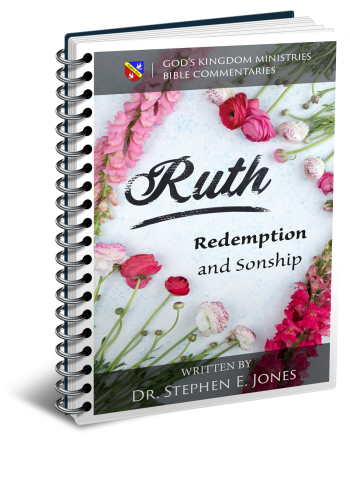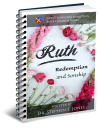Latest Posts
View the latest posts in an easy-to-read list format, with filtering options.

The book of Ruth is the Bible's primary illustration of the law of sonship found in Deuteronomy 25. The story also illustrates the principles of New Covenant marriage as God set forth from the beginning. In addition, it is a natural sequel to the last five chapters of the book of Judges, showing the moral contrast between the home towns of Saul and David as a way of explaining the failure of Saul and the success of David.
Category - Bible Commentaries

In Ruth 1:11-13 Naomi gave her daughters-in-law the opportunity to return instead of crossing the Jordan into a foreign land. They could not know if they would find anyone in Israel who would marry them and give them children, as they so desired.
No doubt many Israelites were suspicious of Moabite women, who were accustomed to ungodly religious practices and were also allies (in times past) of the Midianites, who had seduced the Israelites under the counsel of Balaam (Num. 25:1, 2). Scripture tells us that the Moabites had invited the Israelites to their idolatrous love festival, but the account puts the major blame on the Midianites (Num. 31:2, 7).
An unknown number of Moabite women in that war had been taken as slave-wives for the Israelites (Num. 31:18, 19), and by the time of Ruth, these had been fully integrated into Israelite society. So the problem was not their ethnicity but their religious background. Hence, it was a big step for Ruth and Orpah to immigrate to the land of Judah with Naomi, for they had no guarantee of finding husbands there who would treat them as free women, rather than as conquered slaves.
Ruth 1:14 says,
14 And they lifted up their voices and wept again; and Orpah kissed her mother-in-law, but Ruth clung to her.
In other words, Orpah kissed her mother-in-law to say goodbye, and she returned to the house of her parents, but Ruth would not leave. Both of them loved Naomi, but only one of them actually had the faith to cross the Jordan into the Promised Land. In this we see the two girls playing their roles as Israelites in the wilderness under Moses.
Orpah represented the majority of the Israelites who “were not able to enter because of unbelief” (Heb. 3:19; Num. 14:4). On the other hand, Ruth represented those who had faith.
I understand (by personal revelation) that Orpah was very much torn by this separation and that she hoped that Ruth would return with her. She felt abandoned, even though from a biblical perspective, she was the one abandoning Ruth and Naomi. But such things are a matter of perspective, for when people leave God, they blind themselves and lose sight of His presence. Hence, they mistakenly think that God has abandoned them.
This warped and blind viewpoint is seen also among the Israelites who had refused to enter the Promised Land. Num. 14:1 says,
1 Then all the congregation lifted up their voices and cried, and the people wept that night.
The Israelites wept because they did not think it was possible to take possession of the promises of God. Verse 4 says that the Israelites decided to “return to Egypt.” Orpah, too, shed many tears, for she too lacked the faith to enter the Promised Land.
God’s verdict was for the Israelites to remain in the wilderness for forty years. Shortly afterward, the faithless Israelites resented God’s judgment upon them, and many followed Korah, Dathan, and Abiram (Num. 16:1, 2) in rebelling against Moses, whom God had raised up to lead Israel. Even though they had recognized their sin earlier (Num. 14:40), their hearts remained in a state of rebellion, lawlessness, and faithlessness.
So there is no doubt that Orpah, too, reflected that same spirit, returning to her people while thinking that Ruth had left her. We read no more of Orpah, and no doubt she died in the wilderness (Moab), even as the Israelites themselves had died without receiving the promises. Fortunately for all of them, God took an oath to restore them as well in the end (Deut. 29:14, 15).
Ruth represented those who actually entered the Promised Land. It is not fully clear how we should view Naomi’s prophetic role in this story, for she stands above both Ruth and Orpah. Her main role seems to be that of Moses and Joshua in leading Israel into the Promised Land. In that she gave both girls the opportunity to enter the Promised Land, with one exhibiting faith and the other not, Naomi was playing the role of Moses in Numbers 13 and 14. But her dominant role was that of Joshua who actually led Israel into the land.
This is consistent with the meaning of her name, Naomi, or “grace,” when we view her in light of John 1:17,
17 For the Law was given through Moses, grace and truth were realized through Jesus Christ.
Jesus’ Hebrew name was Yeshua, or Joshua, and “grace” (Naomi) was “realized” through Joshua.
Naomi’s husband, Elimelech, means “My God” (Eli) “is king” (melech). Her marriage pictured the union of Grace and Sovereignty, both characteristics of Jesus Christ. Ultimately, therefore, she is a type of Christ, as were both Moses and Joshua.
Ruth herself is a type of believer who embraces Jesus Christ through the New Covenant. By clinging to Naomi, she also clings to Elimelech, recognizing the sovereignty of God. This is seen more clearly in Ruth 1:16, 17,
16 But Ruth said, “Do not urge me to leave you or turn back from following you; for where you go, I will go, and where you lodge, I will lodge. Your people shall be my people, and your God, my God. 17 Where you die, I will die, and there I will be buried. Thus may the Lord do to me, and worse, if anything but death parts you and me.”
This well-known confession of faith has been used by some to promote the idea that Christians ought to become Jews. It does indeed show that a Moabite could become an Israelite—in this case, a Judahite—because these are national and religious terms, not racial or genealogical.
In the New Covenant, it is the same. To turn to Christ is to become a “Jew” (Ioudeos), as Paul tells us in Rom. 2:28, 29. Paul also tells us specifically that most of those who call themselves “Jews” are not really Jews at all by God’s definition. Only those whose hearts have been circumcised by a New Covenant relationship with Jesus Christ are actually recognized by God as “Jews.”
But because the world has not understood this and has had their own fleshly criteria as to who is and who is not a Jew, the true identity of a “Jew” has been in dispute since the time of Christ.
But Ruth essentially became a Jew, not because she married Boaz of Bethlehem, but because of her faith in the God of Israel prior to meeting Boaz.